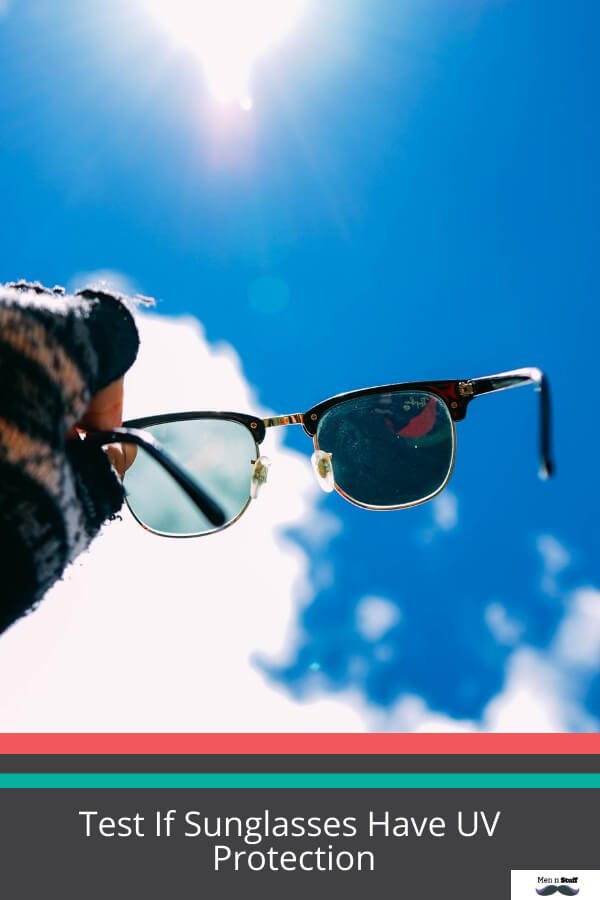To test sunglasses for UV protection, follow these steps:
- Look for a UV 400 label on the sunglasses, indicating full UV protection.
- Shine a UV flashlight through the lenses onto a white surface; if no light passes through, they likely offer UV protection.
- Consult an optician for professional testing if unsure.

How To Test If Sunglasses Have UV Protection?
Purchasing sunglasses is not just about the cool factor. The primary function they serve is to protect the eyes from harmful Ultraviolet (UV) rays. To ensure that sunglasses offer the required level of protection, consumers should be aware of how to test if sunglasses effectively have UV protection.
1. Check the Label
Most sunglasses will have a sticker or label which reveals the degree of UV protection. The sunglasses should ideally block 99-100% of both UV-A and UV-B rays.
2. Look for Quality Certifications
Some countries require sunglasses to comply with certain certifications or standards related to UV protection. For instance, in Europe, a CE (European Conformity) mark is typically used.
3. Use a Photometer
A UV photometer takes an accurate reading of the amount of UV light the sunglasses block. However, these devices can be expensive and are primarily used by professionals.
4. Rely on Reputable Brands
While not a direct test, sunglasses from reputable brands tend to ensure better UV protection as they are generally compliant with international standards.
5. Consider Lens Material
Some lens materials inherently offer a higher degree of UV protection. For example, polycarbonate lenses block nearly 100% of UV light without any need for special coating.
| Testing Method | Explanation |
|---|---|
| Check the Label | The label should indicate 99-100% UV blockage |
| Quality Certifications | Compliance with regional certifications, such as the European CE mark, often implies UV efficiency |
| Use a Photometer | Photometers can affirm the degree of UV blockage, but they are usually costly |
| Rely on Reputable Brands | Trusted brands tend to uphold international quality standards |
| Consider Lens Material | Certain materials, such as polycarbonate, block almost all UV light without additional coating |
In conclusion, ensuring the sunglasses purchased have proper UV protection will help protect the eyes from UV radiation, which can cause several eye health issues.
What Is The Importance Of UV Protection?
Radiation is always harmful to the eyes because it comes from the sun and is not suitable for all eyes. Many people risk their eyes by exposing them to the sun without any protected layers in their sunglasses. It is always vital to keep the vision free from any danger, especially from the sun.
Cataracts’ problem occurs when the eyes’ lens becomes opaque or cloudy due to the sun’s exposure. Several research studies prove that the more your eyes are exposed to the sun, the greater the risk of getting cataracts.
There are other eye-related issues linked to the sun exposure, including retinal tissue damage, macular degeneration, Cornell sunburn, and abnormal growth that happen on surfaces of the eyes.
These are the health risks that you can avoid if your sunglasses have UV protection because they can block radiation from the sun.
How Frequently Should You Wear Sunglasses?
It is vital to wear sunglasses whenever you feel that you are going outdoors for some hours in the daytime. Even if the weather is cloudy, you should always try to wear sunglasses because you never know that the weather can change suddenly.
You also need to know that cloudy weather doesn’t mean a blockage of the ultraviolet Rays. It means that it blocks visible light and reaches the earth’s surface even on a cloudy day.
Whether you’re going to shop for sunglasses at an optical shop or from an online retailer, you must shop for sunglasses with UV 400. It would help if you tried to wear them as often as possible to protect your eyes from radiation and keep them healthy to avoid any problems.
What Should Be The Quantity Of UV Protection In The Sunglasses?
It is always ideal to have UV protection in sunglasses because UV 400 can block almost 100% of the sun’s ultraviolet light Rays. It ensures that Wavelengths of up to 400 nanometers of light Rays such as UV or UV s Rays get blocked.
It would help if you had those shades that may block 75 percent to 90% of visible light and give UVB and UVA protection by blocking more than 99% of UV radiation. These days, most brands provide labels on the sunglasses that specify 100% protection against the Rays of UVA and UVB.
Any larger lenses of frames with a wrap-around style in the sunglasses will give better protection against ultraviolet Rays entering your eyes from every angle. On the other hand, polarized lenses may not be UV-protected lenses because they have filters that can reduce the glare from reflected light.
Hence, you need to follow the instructions on the label about the percentage of UV protection in the sunglasses you want to buy.
Sunglasses With UV Protection
Lots of UV-protective sunglasses are available in the market, and online shopping stores and they have the label of UV protection so that people identify and buy them. Below is the table, which mentions some UV-protected sunglasses along with their product IDs or Codes.
| S. No. | Sunglasses With UV Protection | Product ID/Code |
| 1 | Atom Black X MN with UV 400 protection | CATOMSC1EL1058 |
| 2 | Ivy Vacker UV protected black aviator sunglasses | 143208014 |
| 3 | Aligatorr UV protected wayfarer sunglasses | 13250544 |
| 4 | Sporty matt black polarized Sunglasses with 100% UV protection | P386BK2P |
Can Dark Sunglasses Give Better UV Protection?
Color or darkness doesn’t define the betterment of the UV protection in the sunglasses, nor does it specify the quantity of protection that it can provide. The density and the lens tint color can tell about the amount, and the visible light blocked. For example, to enhance the contrast, you need lighter amber tints, and the dark amber colors help prevent glare, and lenses with grey color lessen the brightness.
Wearing any darker lenses without UV protection may put your eyes at greater risk, and more light will enter the back of your eyes compared to when you wear no glasses. If you want to have darker glasses or any glasses with heavily tinted lenses, you must make sure that they also have UV 400 protection.
Is UV Protection And Polarization The Same?
Lenses with polarization are designed to reduce the glare, reflecting a bright surface as the water’s surface. It also reduces visibility. The polarized lens has a filter to block the intense or extreme reflected light for improved visibility.
All sunglasses with polarized lenses may not come with UV protection. These features are not always used in combination. Polarized lenses are a personal preference, while UV protection is a must to have in the sunglasses.
Conclusion: Ultraviolet or UV protection is significant as the UV radiation through the sun damages the eyes’ lens, cornea, and your eyelid’s skin. Exposure to UV can develop specific ailments of the eyes and the eyelid.
FAQs
Q1. Are Sunglasses Without UV Protection Harmful?
Q2. Is Finding Sunglasses With UV Protection A Difficult Task?
Q3. Can The Coatings And Layers In The Lenses Get Damaged?
Q4. Is The Demand For Sunglasses With UV Protection Proliferating?
Q5. Can Fake Sunglasses Give UV Protection?
References:
https://www.allaboutvision.com/sunglasses/how-to-tell-if-have-uv-protection/
https://www.mrwoodini.com/uv-protected/

